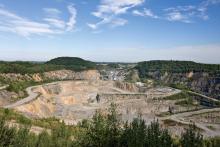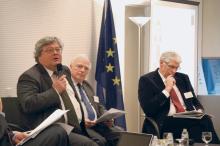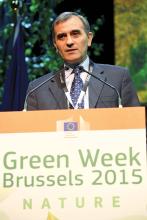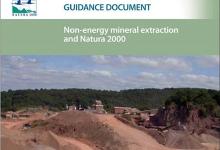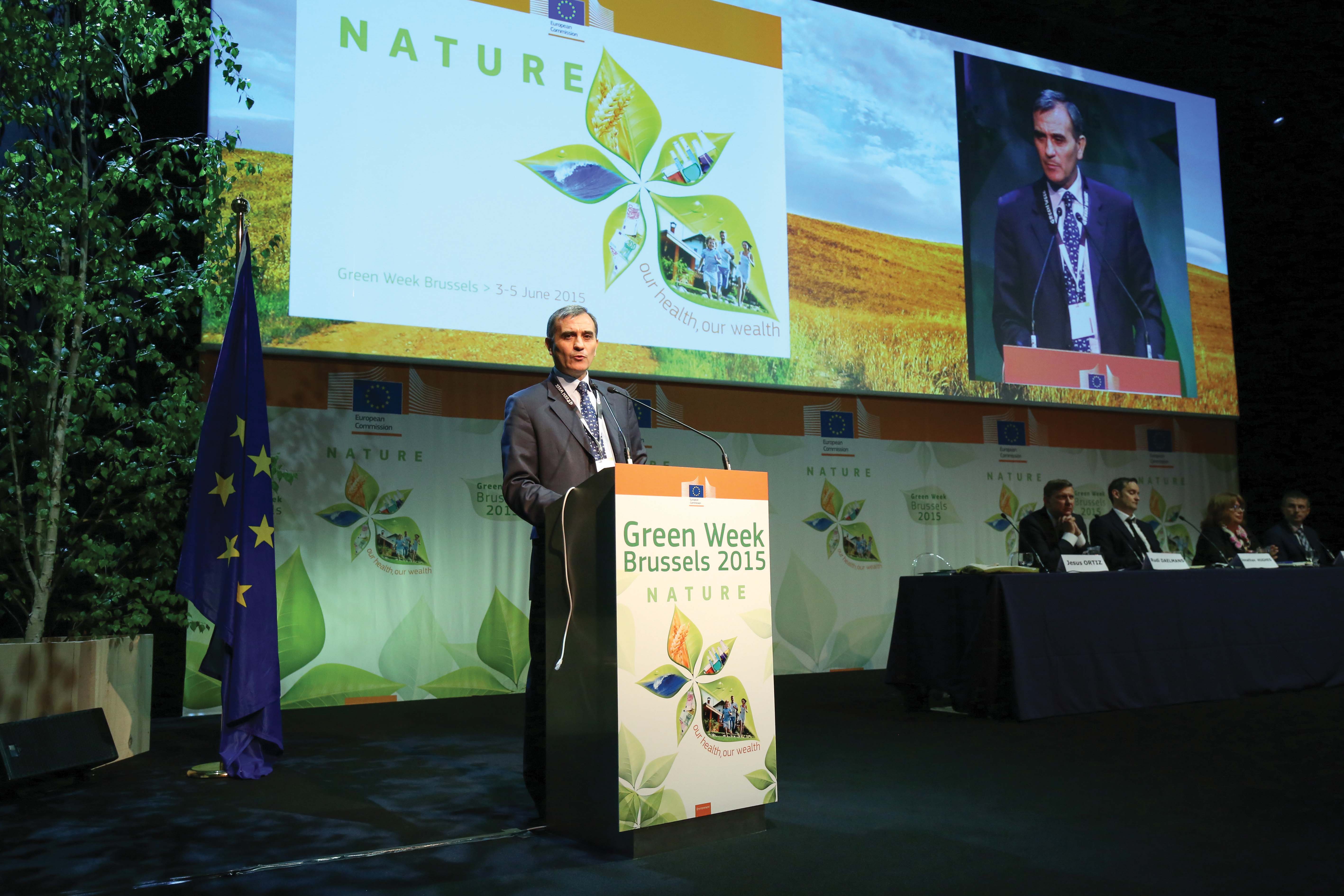
Never before has the European aggregates industry, recognised as the biggest non-energy extractive industry, been so visible to the highest level of EU decision-makers.
The
This included an official satellite event (a site visit); two UEPG speakers with a UEPG stand at Green Week, and many UEPG members attending sessions and networking with EU stakeholders.
Site visit
UEPG and its Belgian Member FEDIEX, together with Birdlife and CEMBUREAU, organised a site visit to the SAGREX (
Representatives from DG Environment and DG Growth along with the NGOs Bird Life International and Friends of the Earth joined in to learn more about the achievements and contribution of aggregates-producing companies to biodiversity and environmental management.
UEPG Vice-President Thilo Juchem welcomed the group, underlining that aggregates extraction is not only compatible with biodiversity but has the potential to create it.
Plant manager Vincent van Overbeke and HeidelbergCement biodiversity expert Dido Gosse presented the projects developed at Quenast before going into the field.
Visitors were guided across the site in two separate groups by biologists explaining the different habitats, plant and animal species. New concepts such as temporary nature were explained and how companies could provide benefits to nature before, during and after aggregates extraction. (See also Patrick Smith’s report in Environment this issue).
For that purpose and for Green Week 2015, UEPG published a brochure, Quarries, Pits and Biodiversity, which is available on the UEPG website. The brochure provides facts and figures about the European aggregates industry and explains how quarries and pits create high-value habitats, and are compatible with biodiversity.
UEPG speakers at Green Week
UEPG President Jesús Ortiz, General Manager Spain and Director Concrete and Aggregates Competence Center for North-West Europe, Mediterranean Basin and Africa for Heidelberg Cement, presented UEPG’s activities and outlined his companies’ performance on environmental management, including the biodiversity and monitoring indicators; the training to employees, and the Internal Guideline for Biodiversity Management in Quarries and Pits of HeidelbergCement.
Being asked at a Business Roundtable, moderated by Jonathan Hughes, Chief Executive of the Scottish Wildlife Trust, what the aggregates industry could further do to help biodiversity, Mr Ortiz identified illegal extraction as a major problem addressed by UEPG.
UEPG Secretary General Dirk Fincke was invited to speak at a Panel, addressing the mid-term review of the EU Biodiversity Strategy.
He emphasised the need to overcome the outdated image that industry destroys environment and that NGOs are blocking economic development. The numerous projects of aggregates-producing companies with NGOs are demonstrating that there are benefits to be gained when cooperating. As with the UEPG President Ortiz, Dirk Fincke offered NGOs to combat together illegal extraction, which harms the environment and the competitiveness of the industry.
Great visibility with a UEPG stand
Thanks to its Members, UEPG was able to offer a range of high-quality publications in several languages; videos; sample of aggregates; T-shirts; bags; games, and it also showcased winners of the UEPG 2013 Sustainable Development Awards of the biodiversity and environmental categories.
Visitors had the possibility to try protective personal equipment (PPE) showing that environmental management goes hand-in-hand with a sound health and safety policy.
Being one of the three business representatives out of almost 50 exhibitors present at Green Week, the UEPG stand attracted many high-level visitors, including the European Commissioner for Environment, Karmenu Vella; Director-General Karl Falkenberg; Director Pia Bucella, several Heads of Unit and Policy Officers from DG Environment; the Director of the European Environment Agency Hans Bruyninckx; the Luxembourg Minister of Environment Carole Dieschbourg (EU Presidency); representatives from the European Parliament; the Joint Research Centre; national and regional Ministries; local governments; academia; NGOs; EU Trade Associations, and UEPG Members as well as a large public.
Natura 2000 fit for purpose?
Although the European Commission states strongly that the current Fitness Check of the Birds and Habitats Directives (Natura 2000 directives) is a regular exercise of the REFIT regulatory fitness and performance programme, and that it is too early to be discussing a revision, the topic was extensively debated during the Green Week.
The potential revision of Natura 2000 saw the NGO communities mobilised and vocal in expressing its strong opposition to what may be seen as a threat of lowering standards of the EU nature legislation. Other stakeholders are split, between the fear of legal uncertainty and the opportunity to cut red tape, and to obtain more balance between the environmental, social and economic pillars of sustainable development.
During the opening session of Green Week 2015, European Commission First Vice-President Frans Timmermans reiterated his commitment towards nature protection, but highlighted the need to modernise legislation without lowering environmental standards.
Environment Commissioner Karmenu Vella did not express publicly whether he was in favour of a revision or not, and this is said to have not convinced the audience and advocates of the Directives, and there were many at the Green Week, and who used this public forum as a platform to save the Directives.
Birdlife, in particular, warned that reopening the Directives would lead to decades of destroyed effort.
Some economic sectors expressed the same point of view, including the European Landowners’ Organisation (ELO).
The area where all could meet and agree was that implementation of the Directives was problematic, which differs significantly between regions and sectors. Agriculture, with its large land-use, was in the spotlight as many felt that the sector has not provided enough effort yet.
The role of the aggregates industry was underlined as a good example of cooperation with the NGOs and as a sector able to do its part for biodiversity.
There is no doubt that the ongoing public consultation will be one of the most popular ones, and that the results will be analysed carefully.
What next?
Green Week 2015 has shown the opportunity to enlarge the UEPG network. UEPG and its Members had been invited to attend several stakeholder meetings, including the first meeting of the Polish B@B Platform which took place on 16 June in Krakow, Poland; the World Forum on Natural Capital on 23-24 November in Edinburgh, Scotland, and the First Annual Congress of the International Land Conservation Network on 19-21 October in Berlin, Germany.
UEPG met key EU stakeholders working on Natura 2000, Biodiversity, Marine Aggregates, Waste, Recycling and other Environment and PR relevant topics for aggregates producers.
During Green Week, UEPG was confirmed as a recognised and trusted EU stakeholder and the aggregates industry as a local, sustainable and responsible industry.
Green Week 2015 allowed UEPG and its Members to illustrate success stories for the wealth of Environment and Biodiversity in Europe.

